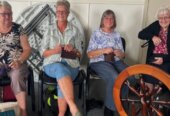
Ryan Fleming
This week, I’m going to depart from my weekly summary of police calls for service to talk about community intelligence.
Police have recently put more emphasis on intelligence gleaned from the community. This may be in the form of general concerns you may have about your general environment, or issues that are arising.
Community intelligence helps us build a picture of what is really going on in any specific area.
This allows police management to decide which resources should be deployed where. This also allows for police to work with other
agencies to help prevent problems arising. A great example of this is when it comes to alcohol.
Alcohol is a huge driver of crime and harm in our communities, both in homes and in the public domain. Alcohol-fuelled violence is a common feature across the country.
Working with licensing authorities and communities, we can have a positive impact on reducing this.
By gleaning intelligence from local areas, we can see where people are exhibiting behaviours such as pre-loading. This gives us an opportunity to work with council and the District Licensing Committee to prevent further harm.
There are a number of ways of reporting community intelligence to police. 105 can be utilised, either online, or on the phone. Crimestoppers is an effective tool utilised by police. The benefit of Crimestoppers information is that it is passed to the relevant police staff but can be
completely anonymous.
Crimestoppers is not a part of the police, rather it is a separate trust that works in partnership with police. The number for Crimestoppers is
0800555111. A report can also be made online.
The safest communities are those that take ownership of safety and work alongside police.
In addition, within our diverse communities there are potential solutions to problems that will be more effective than anything police or government agencies alone can bring about.








